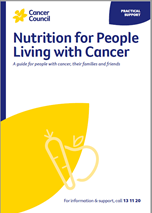- Home
- Cancer Information
- Advanced cancer
- Living with advanced cancer
- Managing symptoms
- Loss of appetite
Loss of appetite
People with advanced cancer often notice changes in their appetite. This may be because of the cancer itself, treatment, or other side effects such as tiredness, nausea or vomiting, taste changes, pain, lack of activity, or depression.
Learn more about:
Overview
A loss of appetite often leads to weight loss and malnutrition. Eating is important to help you maintain your strength, function and quality of life. However, it’s not necessary to force yourself to eat; this may only make you feel uncomfortable and cause vomiting and stomach pain.
Food-type nutritional supplements can increase nutrient intake. These are used as snacks between meals. Many pharmacies and supermarkets sell these specially formulated nutritional supplements. You do not need a prescription, though it may be cheaper if you have one from a doctor or dietitian. Your health care team may suggest a brand to try.
People with advanced cancer may develop a muscle-wasting syndrome known as cachexia. This means the body isn’t using protein, carbohydrates and fats properly. Your doctor or dietitian will discuss ways to manage cachexia, which may include nutritional supplements or medicines such as appetite stimulants.
For more on this, see Nutrition and cancer and listen to our podcast on Appetite Loss and Cancer.
Ways to manage loss of appetite
- Good nutrition can improve quality of life, but if you’re not feeling hungry then it’s okay to focus on eating foods that you enjoy to help stimulate your appetite.
- Eat what you feel like, when you feel like it. Don’t worry so much about timing or set meal times. You could have something lighter like cereal for dinner or a main meal at lunch.
- Use a smaller plate – a big plate full of food may put you off eating.
- Relax dietary restrictions. With advanced cancer, maintaining your weight is more important than avoiding full-fat foods like whole milk or yoghurt.
- Add flavour to foods with lemon or lime juice, fresh or dried herbs and spices.
- Add ice-cream or cream to some fruit or into a smoothie to increase kilojoules and nutrients.
- Try soft foods or clear liquids, which are easier to digest.
- Sip on juice, cordials, smoothies, soft drinks and sports drinks during the day to help keep you hydrated.
- Make meals as enjoyable as possible, e.g. play music, light candles or eat dinner with family or friends.
- Gentle physical activity can stimulate appetite. You could try taking a short walk around the block or some easy exercises.
- Speak to your doctor about trying some medicines that could help improve your appetite.
- See a dietitian for information about nutritional supplements, such as protein shakes, to ensure you don’t lose too much weight.
→ READ MORE: Managing shortness of breath
It was very important for our family and friends to be well informed about the ongoing problems with eating and digestion that occur during surgery. Having support helped us adjust to the changes.
John
Podcast: Appetite Loss and Nausea
Listen to more episodes from our podcast for people affected by cancer
Dr Lucy Gately, Medical Oncologist, Alfred Health and Walter and Eliza Institute for Medical Research, VIC; Dr Katherine Allsopp, Supportive and Palliative Care Specialist, Westmead Hospital, NSW; A/Prof Megan Best, The University of Notre Dame Australia and The University of Sydney, NSW; Dr Keiron Bradley, Palliative Care Consultant, Medical Director Palliative Care Program, Bethesda Health Care, WA; Craig Brewer, Consumer; Emeritus Professor Phyllis Butow, Psychologist, The University of Sydney and Chris O’Brien Lifehouse, NSW; Louise Durham, Palliative Care Nurse Practitioner Outpatients, Princess Alexandra Hospital, Metro South Palliative Care, QLD; Dr Roya Merie, Radiation Oncologist, ICON Cancer Centre, Concord, NSW; Penny Neller, Project Coordinator, National Palliative Care Projects, Australian Centre for Health Law Research, Queensland University of Technology, QLD; Caitriona Nienaber, 13 11 20 Consultant, Cancer Council WA; Xanthe Sansome, Program Director, Advance Care Planning Australia, VIC; Sparke Helmore Lawyers; Peter Spolc, Consumer.
View the Cancer Council NSW editorial policy.
View all publications or call 13 11 20 for free printed copies.
Need to talk?
Support services
Exercise and cancer
Exercise has many benefits both during and after cancer treatment, helping with side effects, speeding up recovery, and improving quality of life
Cancer information
Finding Calm During Cancer
Find calm with our meditation and relaxation podcast
Explore our resource hub
Explore and download our booklets, fact sheets, podcasts, webinars and videos for people affected by cancer
